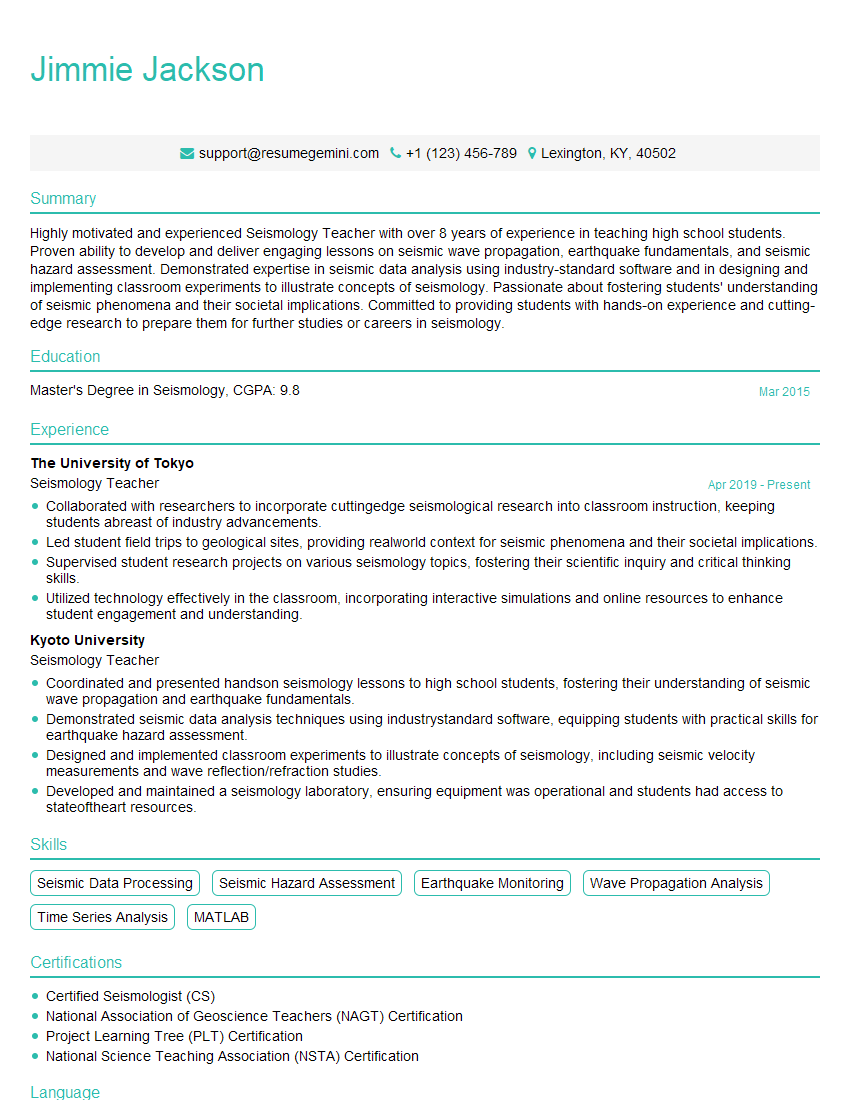Are you a seasoned Seismology Teacher seeking a new career path? Discover our professionally built Seismology Teacher Resume Template. This time-saving tool provides a solid foundation for your job search. Simply click “Edit Resume” to customize it with your unique experiences and achievements. Customize fonts and colors to match your personal style and increase your chances of landing your dream job. Explore more Resume Templates for additional options.

Jimmie Jackson
Seismology Teacher
Summary
Highly motivated and experienced Seismology Teacher with over 8 years of experience in teaching high school students. Proven ability to develop and deliver engaging lessons on seismic wave propagation, earthquake fundamentals, and seismic hazard assessment. Demonstrated expertise in seismic data analysis using industry-standard software and in designing and implementing classroom experiments to illustrate concepts of seismology. Passionate about fostering students’ understanding of seismic phenomena and their societal implications. Committed to providing students with hands-on experience and cutting-edge research to prepare them for further studies or careers in seismology.
Education
Master’s Degree in Seismology
March 2015
Skills
- Seismic Data Processing
- Seismic Hazard Assessment
- Earthquake Monitoring
- Wave Propagation Analysis
- Time Series Analysis
- MATLAB
Work Experience
Seismology Teacher
- Collaborated with researchers to incorporate cuttingedge seismological research into classroom instruction, keeping students abreast of industry advancements.
- Led student field trips to geological sites, providing realworld context for seismic phenomena and their societal implications.
- Supervised student research projects on various seismology topics, fostering their scientific inquiry and critical thinking skills.
- Utilized technology effectively in the classroom, incorporating interactive simulations and online resources to enhance student engagement and understanding.
Seismology Teacher
- Coordinated and presented handson seismology lessons to high school students, fostering their understanding of seismic wave propagation and earthquake fundamentals.
- Demonstrated seismic data analysis techniques using industrystandard software, equipping students with practical skills for earthquake hazard assessment.
- Designed and implemented classroom experiments to illustrate concepts of seismology, including seismic velocity measurements and wave reflection/refraction studies.
- Developed and maintained a seismology laboratory, ensuring equipment was operational and students had access to stateoftheart resources.
Certificates
- Certified Seismologist (CS)
- National Association of Geoscience Teachers (NAGT) Certification
- Project Learning Tree (PLT) Certification
- National Science Teaching Association (NSTA) Certification
Languages
- English
- French
- German
Career Expert Tips:
- Select the ideal resume template to showcase your professional experience effectively.
- Master the art of resume writing to highlight your unique qualifications and achievements.
- Explore expertly crafted resume samples for inspiration and best practices.
- Build your best resume for free this new year with ResumeGemini. Enjoy exclusive discounts on ATS optimized resume templates.
How To Write Resume For Seismology Teacher
- Highlight your passion for seismology and your ability to convey complex concepts in a clear and engaging manner.
- Quantify your accomplishments whenever possible, using specific metrics to demonstrate the impact of your teaching.
- Tailor your resume to the specific requirements of the job you are applying for, emphasizing skills and experience that are most relevant to the role.
- Proofread your resume carefully for any errors in grammar, spelling, or punctuation.
Essential Experience Highlights for a Strong Seismology Teacher Resume
- Coordinate and present hands-on seismology lessons to high school students, fostering their understanding of seismic wave propagation and earthquake fundamentals.
- Demonstrate seismic data analysis techniques using industry-standard software, equipping students with practical skills for earthquake hazard assessment.
- Design and implement classroom experiments to illustrate concepts of seismology, including seismic velocity measurements and wave reflection/refraction studies.
- Develop and maintain a seismology laboratory, ensuring equipment is operational and students have access to state-of-the-art resources.
- Supervise student research projects on various seismology topics, fostering their scientific inquiry and critical thinking skills.
- Utilize technology effectively in the classroom, incorporating interactive simulations and online resources to enhance student engagement and understanding.
- Collaborate with researchers to incorporate cutting-edge seismological research into classroom instruction, keeping students abreast of industry advancements.
Frequently Asked Questions (FAQ’s) For Seismology Teacher
What are the key skills required to be a successful Seismology Teacher?
Key skills for a successful Seismology Teacher include strong knowledge of seismic wave propagation, earthquake fundamentals, and seismic hazard assessment, as well as proficiency in seismic data analysis techniques, classroom management skills, and the ability to communicate complex concepts in a clear and engaging manner.
What is the job outlook for Seismology Teachers?
The job outlook for Seismology Teachers is expected to be good over the next decade, with an increasing demand for qualified professionals to teach in high schools and universities, as well as to work in research and industry.
What are the career opportunities for Seismology Teachers?
Seismology Teachers can pursue a variety of career opportunities, including teaching at high schools and universities, conducting research in government or industry laboratories, or working as consultants in the field of earthquake hazard assessment and mitigation.
What are the challenges faced by Seismology Teachers?
Seismology Teachers may face challenges such as the need to keep up-to-date with the latest advancements in seismological research, the need to effectively convey complex concepts to students, and the need to manage a classroom environment that is both safe and conducive to learning.
What are the rewards of being a Seismology Teacher?
The rewards of being a Seismology Teacher include the opportunity to share your knowledge and passion for seismology with students, the satisfaction of helping students to understand and appreciate the complexities of the Earth’s systems, and the opportunity to make a positive impact on the lives of young people.
How can I become a certified Seismology Teacher?
To become a certified Seismology Teacher, you will typically need to complete a bachelor’s degree in seismology or a related field, as well as pass a state-approved certification exam.
What is the salary range for Seismology Teachers?
The salary range for Seismology Teachers can vary depending on factors such as education, experience, and location, but the median annual salary for high school Seismology Teachers is around $60,000.